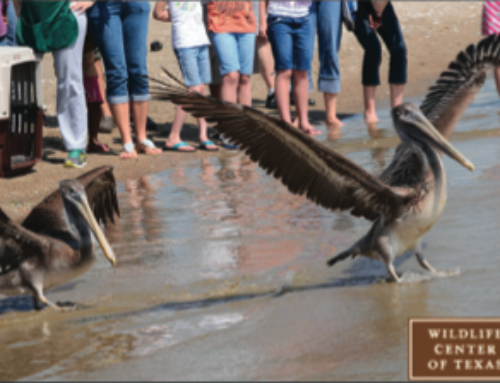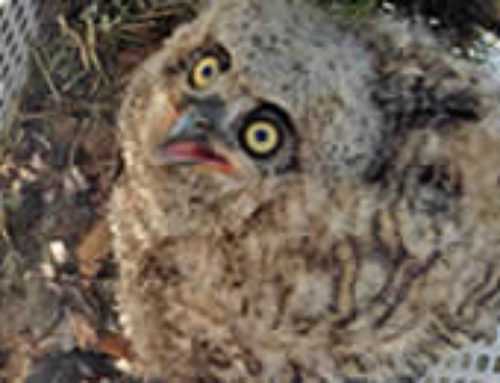 The Wildlife Rehab & Education Center, Houston’s only native wildlife trauma hospital for ALL species of injured, ill and orphaned wildlife is reminding the public to be on the lookout for wildlife impacted by the freezing temperatures. WR&E Wildlife Center has seen an increase in animals brought to the Center due to the freezing weather. In addition to Brown Pelicans, another species that has been impacted by the freezing temperatures is the Eastern Screech Owl. The Wildlife Center has been receiving about 4-5 Screech Owls every day for the last few days. This is highly unusual and seems to be related to the weather. Most of the birds are very emaciated and hypothermic. The owls are only about 8 inches tall and either gray or rust colored.
The Wildlife Rehab & Education Center, Houston’s only native wildlife trauma hospital for ALL species of injured, ill and orphaned wildlife is reminding the public to be on the lookout for wildlife impacted by the freezing temperatures. WR&E Wildlife Center has seen an increase in animals brought to the Center due to the freezing weather. In addition to Brown Pelicans, another species that has been impacted by the freezing temperatures is the Eastern Screech Owl. The Wildlife Center has been receiving about 4-5 Screech Owls every day for the last few days. This is highly unusual and seems to be related to the weather. Most of the birds are very emaciated and hypothermic. The owls are only about 8 inches tall and either gray or rust colored.
Signs that an animal is in distress include a glazed unfocused look to the eyes, sheltering in uncommon places (in the open or for birds and squirrels, on the ground) and allowing humans to approach closer than normal. If you find an animal in distress, it is important to pick them up and get them to the Wildlife Center as soon as possible. The best way to pick them up is to drape a soft rag over them and gently scoop them into a box. If you are concerned about being bitten or scratched, wear leather gardening gloves.
 The Wildlife Center is open 7 days a week from 9 am – 4 pm. If the animal is found after hours put it in a box, get it warmed up, and leave a message at the Wildlife Center 713-861-9453. Your message will be returned promptly the next morning. In the meantime, warm the animal by bringing it indoors (or the garage if indoors isn’t possible) and either place the box on a heating pad set on low or add a warm rice sock to the box. To prepare a rice sock, pour dry uncooked rice into a clean sock, knot the end or tie it closed with string. Place the rice sock into the microwave for 30 second intervals until warm. The rice sock should be placed close to by not directly on or under the animal. Check every half hour to see if the rice sock needs to be reheated. Most heating pads now have an automatic shut-off switch that turns off the heating pad after 2 to 3 hours, so check hourly.
The Wildlife Center is open 7 days a week from 9 am – 4 pm. If the animal is found after hours put it in a box, get it warmed up, and leave a message at the Wildlife Center 713-861-9453. Your message will be returned promptly the next morning. In the meantime, warm the animal by bringing it indoors (or the garage if indoors isn’t possible) and either place the box on a heating pad set on low or add a warm rice sock to the box. To prepare a rice sock, pour dry uncooked rice into a clean sock, knot the end or tie it closed with string. Place the rice sock into the microwave for 30 second intervals until warm. The rice sock should be placed close to by not directly on or under the animal. Check every half hour to see if the rice sock needs to be reheated. Most heating pads now have an automatic shut-off switch that turns off the heating pad after 2 to 3 hours, so check hourly.
Check out WR&E Wildlife Center website for more information at www.wrande.org under the “Need Help?” tab or if you wish to contibute towards the care of these weather impacted animals, please do so under the “Donate” tab.
You can help your local wildlife by putting out water for them and breaking the ice several times a day to give both diurnal and nocturnal animals access. You can also help by putting out a variety of seed for the birds and either dry dog or cat food for the mammals. Animals whose diet relies on insects, amphibians, fish, reptiles and small mammals are really suffering right now because their prey is hunkered down trying to stay warm.






Leave A Comment